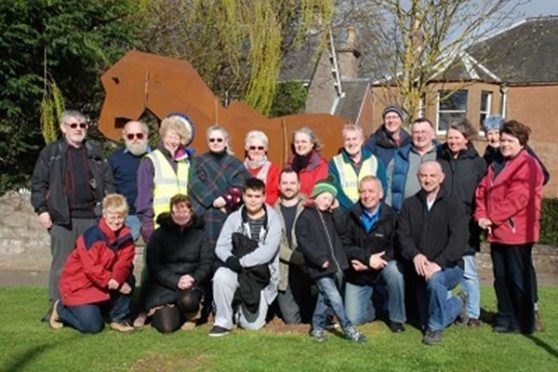A Perthshire community garden group which has won a prestigious national award has expressed its delight at the announcement.
Coupar Angus Pride of Place was awarded the gold in the Large Village category at the Royal Horticultural Society’s (RHS) Britain in Bloom UK Finals.
RHS judges visited 78 finalists across the UK over the summer to assess each group against three key criteria: community participation, environmental responsibility and horticultural achievement.
Depending on the standard reached, a gold, silver gilt, silver or bronze medal is awarded, with a winner in each category and discretionary awards for achieving excellence in particular fields.
Anne Easson, chair of Coupar Angus Pride of Place, said the group were “absolutely delighted” to have been awarded the gold medal.
“We’re delighted and this is the third time we have won a gold medal – the others being in 2013 and 2015,” she said.
“We have a dedicated team who tidy up Coupar Angus and this medal is a reward for their hard work and support for the village.
“Lots of people help us in so many ways including making yellow and blue buttonholes for the group which we wore at the Britain in Bloom finals. We also get good support from Perth and Kinross Council.”
Coupar Angus Pride of Place was formed in 2006, with the main aim being to restore pride to the village by carrying out physical environmental improvements and also by socially uniting the community through support for social activities.
Gardening groups in Kirkcaldy and Kilconquhar saw their hard work and dedication pay off with Silver Gilt awards in their respective categories at the ceremony in Llandudno, North Wales.
Kirkcaldy was recognised in the Small City category, while Kilconquhar secured its award in the Small Village section.
Roger Burnett, chair of the RHS Britain in Bloom judges, said: “It’s a huge honour to witness how Britain in Bloom brings people together and the lengths that groups go to to make their communities clean, green and beautiful.
“We saw an incredible diversity of different planting schemes, including wildflower meadows for wildlife, community food growing and plants chosen to cope with our changing climate.
“This year, the standard was as high as ever but what really stood out was the creativity and ingenuity that groups showed in tackling the specific challenges of their particular areas, whether that be lack of funding, local social issues or tricky site conditions.”
